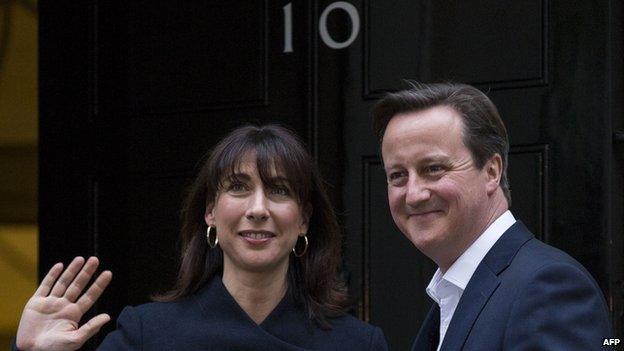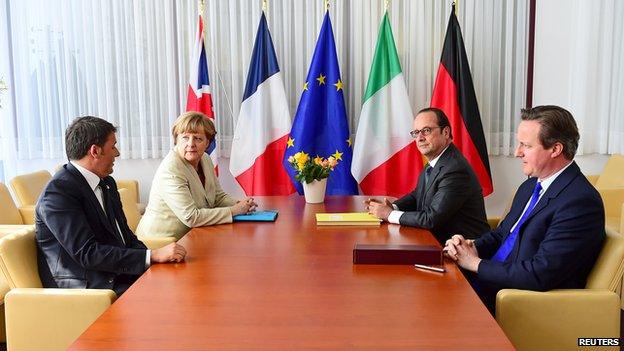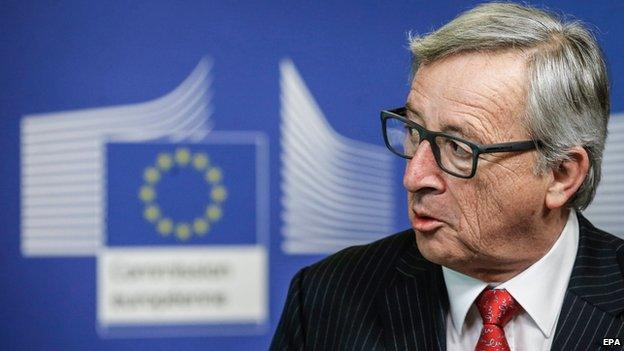UK 'political earthquake' rocks EU
- Published
- comments

PM David Cameron has promised an in/out referendum on UK membership of the EU
The words "political earthquake" have been translated into numerous European languages today, making front page news across the continent.
The mood is possibly best summed up in the Le Monde headline: Triumph for Cameron. Concern for Europe.
While Britons now examine the domestic minutiae of the election result, here in mainland Europe the vote means one thing - a referendum on Britain's membership of the EU.
And that has the potential to create an earthquake of its own.
The guardian of the EU treaties Mr Cameron wants to change - Commission President Jean Claude Juncker - said again today he'd listen to what Britain's new government proposed, but that real change must be approved by EU countries rather than institutions.
Governments had already been discussing a possible framework for renegotiating Britain's relationship with the EU behind closed doors. Now that talk will go public, certainly at next month's summit of EU leaders here in Brussels - they'll want to hear David Cameron's wish list.
A source close to the German government told me that, although Chancellor Merkel and David Cameron have a good relationship and she has often repeated that she wants Britain to stay in the EU, there is no appetite in Berlin to be the chief negotiator.

Other EU leaders have little desire to be chief negotiator with Britain
"The German government doesn't want to be the one to wag its finger at the UK, threatening what might happen if it leaves," he said. "This is not about bilateral negotiations. This is about the UK and Brussels."
Still, much of the pre-negotiation period will consist of British diplomats and political leaders chatting with their European counterparts - about the possible, the impossible and wiggle room in between.
Soon after the British election results were known, French President Francois Hollande invited David Cameron to Paris to talk, he said, about the EU, among other things.
France will hope to persuade David Cameron that he does not need treaty change to re-shape Britain's relationship with the EU.
This is less out of French love for the EU project as it stands and more about the fear of populists at home.
Any change to EU treaties has to be put to the people of France in a referendum.
The full force of the popular euro-sceptic, anti-immigrant National Front would be unleashed - terribly close to France's presidential election in which the National Front's leader is a strong contender (though not the favourite).
David Cameron's timetable of 2017 for a UK referendum on the EU also clashes with parliamentary elections in Germany.
The traditional Franco-German motor of Europe is all too aware that popular opinion is quite impatient by now with what is seen as the UK's pick-and-mix attitude to the EU, derisively described in Germany as "Extrawurst" (an expression coming from the traditional German sausage but meaning to get special treatment) and leaders won't want to be seen to be pandering too much to the UK ahead of a national vote.

Jean-Claude Juncker said he'd listen to what Britain's new government proposed
So the countdown starts now. 2017 is not far off and Brussels is hardly known for speedy decision-making.
Expect quite some flexibility. Few countries want to see the UK's buoyant economy leave the fold. But there will be limits.
Freedom of movement - European citizens' right to live and work wherever they want in the EU - has often been flagged up as a red line.
This could cause complications for David Cameron with immigration such a hot issue within his own party.
European federalists are also concerned. They worry that Britain's desire for "less Brussels" will now be echoed elsewhere, leading possibly to an unravelling of the EU as they know it or dream it could and should be.